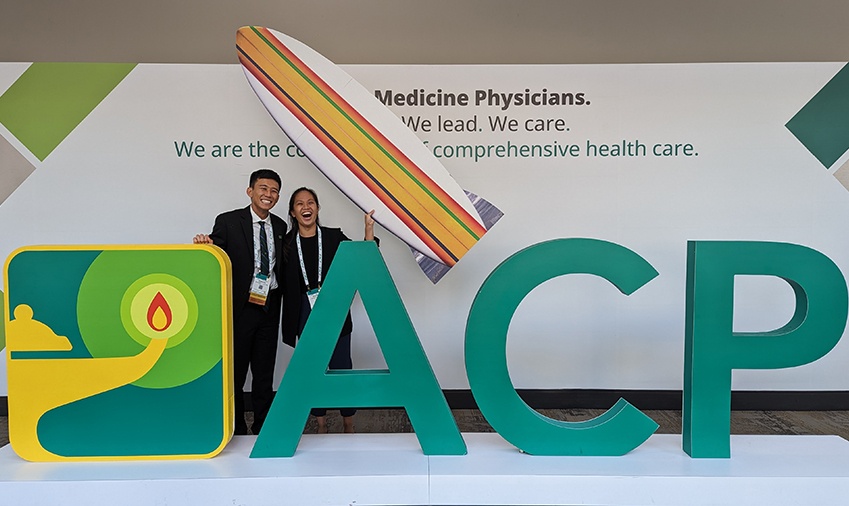
Edward Nguyen, a medical student at the John A. Burns School of Medicine (JABSOM), wants to improve survival outcomes of patients with advanced breast cancer through molecular therapies aimed at targetable genes. He recently won first place with the local American College of Physicians Conference in 2022 and was sponsored to present his findings this year at the national conference in April– the nation’s largest gathering of internal medicine physicians, subspecialists, medical students and allied health professionals.
During the conference, Nguyen was able to network with doctors, meet potential mentors in internal medicine and oncology, field tips on how to best prepare his residency application, attend lectures and get a general idea of what an in-person conference entails. As an aspiring medical oncologist, Nguyen says it was an invaluable experience, especially to view what is trending in terms of new research regarding cancer and other fields within internal medicine.
“As a medical student doing research, ultimately I’d like to contribute to the general public knowledge in the field, and hopefully my publications can improve our understanding of cancer,” Nguyen said.
However, if not for the financial support he received, Nguyen says he may not have attended the California conference. Rough estimates include at least $800 for a two-day round trip from Honolulu to San Diego sans tax, $100 per day for car rental, $300 per night hotel stay, meal costs as well as any additional conference fees that may apply.
Although the benefits of students presenting their research work to the rest of the world are plenty, the logistics of traveling from an island begets financial hurdles and puts Hawaiʻi students at an academic disadvantage.
“When the students are engaged in research, an important aspect of that is to share their findings. As you can imagine, that can be cost prohibitive, especially for students from Hawaii,’ said Medical Student Research Director Dr. Russell Woo, who has been digging into his own wallet to help JABSOM students in this way. He isn’t the only faculty to do so.
“Our students are the future, they really are. They’re the next generation and I’m passionate about giving them every opportunity to train the best they can, so that the next generations of Hawaii’s physicians will only get better and better at what they do,” Woo said.
Another avenue for students to share their research work is through journals, many of which are open access. Under an open access publication model, scientific articles are made freely available to readers, making it easier to share research findings to a broad audience. However, the authors pay an article processing charge to offset the costs, ranging anywhere from $1,500 to $3,000, depending on the publication.
“JABSOM students have found ways to stand out amongst their peers at larger institutions by working extensively in the fields of clinical and basic research, and have been contributing significantly to biomedical science.” said Woo.
There is great value in having JABSOM students present their work at national and international scientific meetings, and publish their work in respected peer-reviewed journals because they are conducting the research tailored to the local community.
“Here in Hawaiʻi, we have a unique population and who else is going to answer the questions that are relevant to us?” said Woo.
That’s a question that medical student Maveric Abella has been trying to answer. After coming across various studies on PubMed, she was surprised at the absence of research on Native Hawaiian and Pacific Islanders (NHPI) and American Indian Alaska Natives. She began to fill in the blanks by collating data from many studies with the goal of including these populations in statistical outcomes for general surgery and orthopedics.
“Caring for the people of Hawaiʻi and Pacific Islanders has been my inspiration for coming to medical school, so being able to uncover that data (in regards to racial disparities) and sharing that with the rest of the world is what really excites me about the research that I’ve done here at JABSOM,” Abella said.
Abella, who also attended the ACP Conference in San Diego with Nguyen earlier this year, said she would not have been able to attend without financial support.
“I think, especially for a lot of us students here in Hawaiʻi, we already have so many expenses such as paying for medical school itself, along with rent and gas,” said Abella, regarding financial barriers that she and her classmates face.“It’s just really hard for students to be able to afford and puts you at a disadvantage. It’s like another barrier in medicine when there’s so many that already exist.”
JABSOM students are already making significant contributions to biomedical science through research. Sharing this work at the national stage through presentations and publications is important for science and for the students’ budding medical careers. However, this requires financial support.
“A fund would be invaluable to the students but also be a big support to the community and faculty who mentor them, especially those that are volunteering to do so. It would be a win-win in that circumstance,” Woo said.
If you are interested in supporting our students, you can make a gift towards student publication expenses or student research & travel costs.